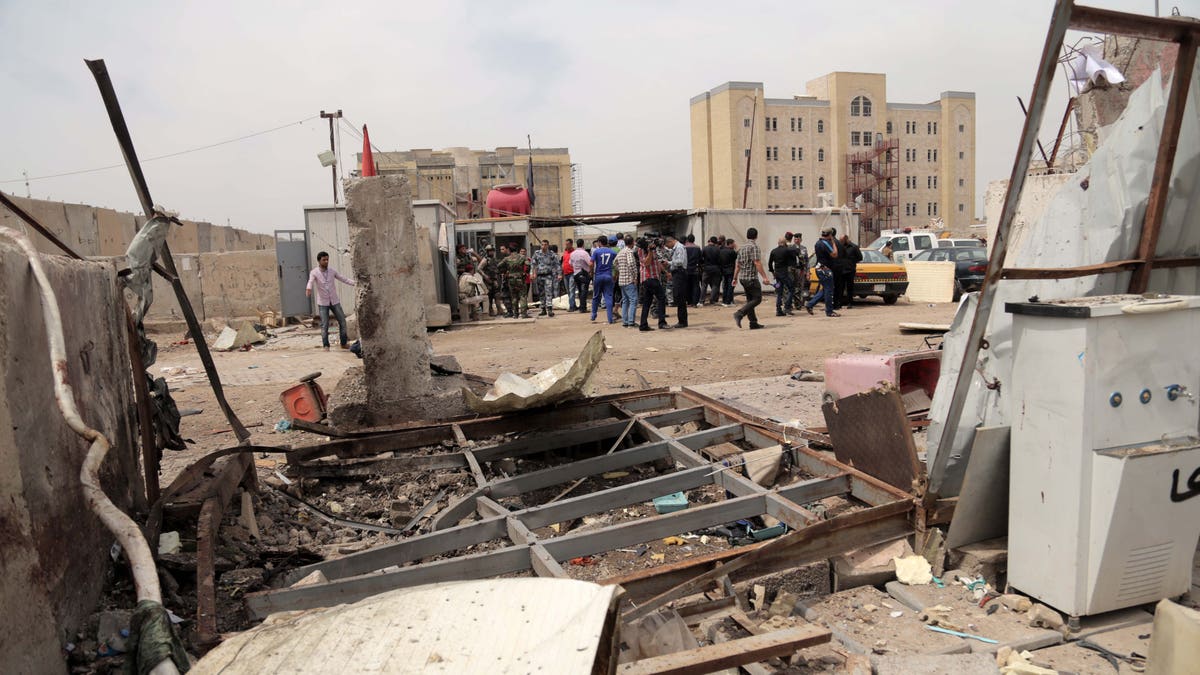
April 20, 2014 - Iraqi security forces stand guard at the main gate of a Shiite private college following an attack by militants in Baghdad's eastern neighborhood of Ur, Iraq. Suicide bombings and other attacks across Iraq killed at least 30 people Monday, officials said, the latest in an uptick in violence before parliament elections later this month. (AP)
BAGHDAD – Suicide bombings and other attacks across Iraq killed at least 30 people and wounded nearly 70 more on Monday, officials said, the latest in an uptick in violence as the country counts down to crucial parliament elections later this month.
Over the past year, violence has surged in Iraq to levels unseen since 2008. The increase in deadly shootings and bombings has become the Shiite-led government's most serious challenge as the nation prepares to head to the polls on April 30 -- the first vote in Iraq since the U.S. army withdrawal in 2011.
Monday's deadliest attack took place south of Baghdad in the town of Suwayrah, where a suicide bomber rammed his explosives-laden car into a police checkpoint, killing 12 people -- five policemen and seven civilians. A police officer said 19 people were wounded in the attack.
In the nearby town of Madain, about 20 kilometers (14 miles) southeast of Baghdad, another suicide car bomber struck an army checkpoint, killing three soldiers and two civilians, a second police officer said. Twelve other people were wounded, he said.
An Iraqi soldier was killed and three were wounded when a roadside bomb struck their patrol in the northern town of Mishahda, 30 kilometers (20 miles) north of Baghdad, a police officer said. And in the town of Latifiyah, about 30 kilometers (20 miles) south of Baghdad, gunmen in speeding car went on a shooting spree, killing one civilian and wounding two, a police officer said.
Monday evening, three more bombs struck various parts of Baghdad, killing at least 11 people and wounding 32, police said.
Medical officials confirmed the causality figures. All officials spoke on condition of anonymity because they were not authorized to talk to the media.
Monday's carnage came a day after at least 18 people and wounded nearly 50 across the country.
Those attacks included a coordinated assault on a private Shiite college in Baghdad in which a suicide bomber with an explosives belt attacked the main gate while three militants attacked the back gate of the college. Four policemen and one teacher were killed and 18 other people were wounded.
Hours after the attack, an al-Qaida spin-off group known as the Islamic State of Iraq and the Levant claimed responsibility for the attack, accusing the college's professors of teaching students to "curse" the Prophet Muhammad and training them to "fight" the Sunnis in Iraq and Syria.
The authenticity of the statement could not be independently verified, but its style was consistent with previous statements.
The U.N. Special Representative in Iraq, Nickolay Mladenov, described the college assault as a "vicious and cowardly attack on innocent civilians."
"This is yet another example of sectarian-based violence that the people of this country need to fight in order to bring this country to tranquility," Mladenov said in a statement. "The target has been selected to incite sectarian hatred, with utter disregard for human life and religious values," he added.
According to the United Nations, 8,868 people were killed in Iraq last year -- the country's highest death toll since a peak of sectarian bloodletting in 2007.
